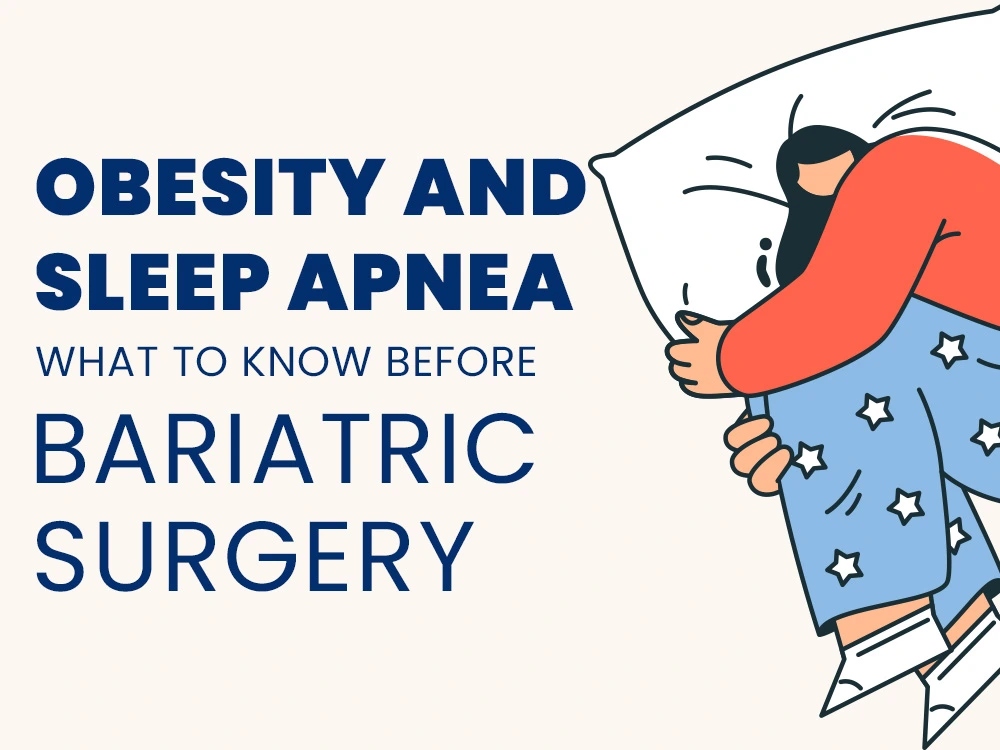
Obesity is a major health concern worldwide, and it can lead to numerous complications, including sleep apnea. Sleep apnea, particularly obstructive sleep apnea (OSA), is a condition where breathing is repeatedly interrupted during sleep, leading to fragmented rest and a range of health problems. For individuals struggling with obesity, the risk of developing sleep apnea is significantly higher, which can complicate the path to better health.
Bariatric surgery, which is a life-changing procedure for individuals who struggle with severe obesity, is often considered for its ability to induce significant weight loss and improve overall health. However, for those with obesity-related sleep apnea, there are important considerations to understand before moving forward with bariatric surgery. In this post, we will discuss the relationship between obesity and sleep apnea, the impact of bariatric surgery on sleep apnea, and essential pre-surgery considerations for patients with sleep apnea.
Understanding the Link Between Obesity and Sleep Apnea
Sleep apnea is often linked to obesity, especially when excess fat accumulates around the neck and throat area. This fat can obstruct the airway, making it more difficult to breathe while sleeping. In individuals with obstructive sleep apnea, the throat muscles relax too much during sleep, causing partial or complete blockages of the airway. This leads to loud snoring, gasping for air, and disrupted sleep cycles, which can result in daytime fatigue, cognitive issues, and increased risk for cardiovascular diseases, high blood pressure, stroke, and diabetes.
Obesity significantly increases the likelihood of sleep apnea. According to the American Academy of Sleep Medicine, approximately 60-90% of individuals with obstructive sleep apnea are overweight or obese. Moreover, the higher the body mass index (BMI), the more likely someone is to develop sleep apnea. For this reason, individuals struggling with obesity and sleep apnea often find themselves dealing with two interconnected health challenges that require a multifaceted approach to treatment.
How Bariatric Surgery Can Improve Sleep Apnea
Bariatric surgery, including procedures like gastric bypass and sleeve gastrectomy, is designed to help individuals lose significant amounts of weight. The goal of these surgeries is not only to improve physical appearance but also to reduce the risks associated with obesity, including sleep apnea.
Studies have shown that bariatric surgery can have a profound impact on sleep apnea symptoms. As patients lose weight following surgery, fat deposits around the neck and throat are reduced, which can help open up the airway and reduce or eliminate the frequency of apneas (pauses in breathing). In many cases, patients experience significant improvements in sleep quality, reduced snoring, and even complete resolution of sleep apnea.
For example, a study published in Obesity Surgery found that 70-80% of patients with obstructive sleep apnea saw improvements or resolution of their symptoms following bariatric surgery. The results suggest that bariatric surgery not only promotes weight loss but can also reverse many of the health complications associated with obesity, including sleep apnea.
Pre-Surgery Considerations for Patients with Sleep Apnea
If you have obesity-related sleep apnea and are considering bariatric surgery, there are several key factors to consider before undergoing the procedure:
1. Undergoing a Sleep Study
Before proceeding with bariatric surgery, it’s essential to confirm the presence and severity of sleep apnea. A sleep study (polysomnography) is typically recommended to evaluate the frequency and severity of apneas during sleep. The results will help your healthcare provider understand the extent of your sleep apnea and determine the best course of action. A sleep study can also identify other sleep disorders that may need to be addressed before or after surgery.
If you’ve already been diagnosed with sleep apnea, it’s important to continue using your CPAP (Continuous Positive Airway Pressure) machine or other prescribed treatments as recommended by your healthcare provider. These devices help keep the airway open during sleep and improve breathing patterns, thus reducing the risk of complications during surgery.
2. Managing Sleep Apnea Before Surgery
For patients with diagnosed sleep apnea, it’s crucial to manage the condition before surgery. Even with bariatric surgery, it’s possible that sleep apnea may persist, especially if weight loss is not significant or if other risk factors contribute to the condition.
Your healthcare team may recommend using CPAP therapy or other forms of airway pressure devices to improve your sleep quality leading up to surgery. These devices help prevent airway obstructions during sleep, making it easier for your body to get adequate rest and reducing the strain on your heart and other organs.
3. Preparing for Surgery
If you have sleep apnea, the anesthesia team will need to be aware of your condition before your surgery. Anesthesia can affect breathing, and the team will want to ensure that they have the appropriate tools and strategies in place to help manage your breathing during the procedure.
In some cases, bariatric surgery patients with sleep apnea may need to use a CPAP machine during recovery in the hospital to ensure proper oxygen levels and prevent complications. This may be discussed with your surgeon and anesthesiologist prior to your procedure.
4. Post-Surgery Monitoring and Care
Following bariatric surgery, it’s important to continue monitoring your sleep apnea symptoms. Many patients see improvement after losing weight, but it’s still possible for some to experience residual or ongoing symptoms of sleep apnea. Regular follow-up appointments with your healthcare provider and a sleep specialist will help ensure that any lingering issues are addressed.
In some cases, a follow-up sleep study may be required to assess changes in your sleep apnea symptoms post-surgery. If necessary, your healthcare provider may adjust your CPAP settings or recommend other treatments to improve your breathing during sleep.
The Role of Bariatric Surgery in Your Health Journey
While bariatric surgery can significantly improve the symptoms of obesity-related sleep apnea, it’s important to recognize that it is just one part of your broader health journey. Achieving and maintaining long-term weight loss requires ongoing lifestyle changes, including healthy eating, regular physical activity, and adherence to medical recommendations.
At Novemedical, we understand that each patient’s journey is unique, especially when dealing with complex conditions like obesity and sleep apnea. Our team is here to guide you through the process, from pre-surgery assessments to post-surgery care. If you are struggling with obesity and sleep apnea, bariatric surgery may be an option worth considering.
For more information about how bariatric surgery can help improve your health and quality of life, request a free consultation today.
Obesity and sleep apnea are two interconnected health issues that often go hand in hand, with each condition exacerbating the other. Bariatric surgery offers an opportunity to significantly improve both weight and sleep health. By addressing the underlying causes of sleep apnea and promoting weight loss, bariatric surgery can lead to better sleep quality, improved heart health, and a reduced risk of complications. If you are struggling with obesity and sleep apnea, consider exploring bariatric surgery as part of your comprehensive health strategy.
With careful planning, a thorough understanding of your condition, and the guidance of healthcare professionals, bariatric surgery can be a transformative step toward better sleep, health, and overall well-being.





